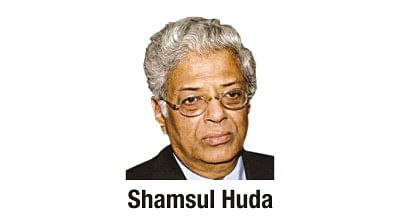Fair polls difficult under party govt

Chief Election Commissioner ATM Shamsul Huda yesterday said it is difficult to hold a free and fair election under a partisan government.
Neither the prime minister nor other ministers ever pursued the Election Commission (EC) to do something in their favour. But the MPs at the local level try to influence officers-in-charge of police and upazila nirbahi officers to work for them, he said.
“They [MPs] have control over the local administrative officials. Moreover, during the election days we have to engage a huge number of workforces, who do not belong to the administrative control of the commission. That is why, it is difficult to hold a free and fair election under the political (partisan) government,” Huda said.
The CEC was speaking on the topic “Role of the Election Commission in Conducting a Free and Fair Election” at a luncheon meeting organised by American Chamber of Commerce in Bangladesh (AmCham) at a hotel in the capital.
The CEC's comments came at a time when both the ruling and opposition parties are at loggerheads over restoration of the caretaker government system.
As per the current constitutional provision, the existing MPs will remain in their offices during the next election as the parliament will not be dissolved.
Addressing the meeting, the CEC said many convicted and crooked persons contest in polls in Bangladesh. Although the political parties have 'good' candidates available, the party high commands do not nominate them, he said, adding, “The political parties have other preferences.”
“The political parties do no trust the commission,” Huda said, adding that the EC needs cooperation from all the stakeholders to hold a free and fair election. “Are they (political parties) co-operating us?” he questioned.
Criticising the political parties, the CEC said there is no corresponding change in behaviour, attitude and manner of our political parties.
Though local government election is a non-partisan affair, the political parties had interfered in all the local body polls, he said.
During the EC's discussion with the political parties, they pledged to de-link parties' relations with their front organisations and overseas units. But they are doing the opposite, Huda said.
Claiming that preventing the use of black money in elections is a major challenge, he said candidates give money to voters in different forms like--refilling mobile phone credit, paying bank loans and others.
On the government's denial to deploy the army in Narayanganj City Corporation polls despite the EC's request, the CEC said, “I think the army should not be deployed in any election. It was my fault to agree with the then mayoral candidate Selina Hayat Ivy's request to deploy the army.”
He also reiterated his recommendation to form a neutral 'search committee' to appoint the new CEC and other commissioners.
Huda and two other election commissioners were appointed in February 2007 by the then caretaker government. Their tenures of appointment will expire by February next.
The CEC also recommended that the next election commission, through negotiation with the political parties, take initiative to hold the national election for seven days--a day each for seven divisions of the country.
Establishing rule of law is the main prerequisite for flourishing democracy in a country, he observed.
“The next commission should think towards developing a mechanism on how the expatriate Bangladeshi people can exercise their franchise,” Huda said.
He also stressed the need for political unity to attract foreign investment in the country.
AmCham President Abtab ul Islam also addressed the meeting, while a number of distinguished persons including former ministers, former ambassadors, businessmen and academicians, among others, attended it.

 For all latest news, follow The Daily Star's Google News channel.
For all latest news, follow The Daily Star's Google News channel. 



Comments